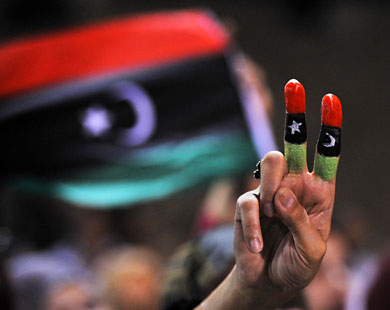Libya's new leaders moved to restore order to Tripoli on Saturday, instructing fighters from the provinces to go home as they prepared to transfer to the capital from their wartime base in Benghazi,Al Arabiya reported,
UN chief Ban Ki-moon said the world body stood ready to assist in re-establishing security after the nearly seven-month uprising that ousted Muammar Qaddafi as Western governments that backed the rebels faced embarrassing questions about their previous complicity with his regime.
There was still no firm word on the whereabouts of the toppled strongman after he defiantly threatened to lead a protracted insurgency in audio tapes aired by Arab media on Thursday.
The victorious rebels extended until next weekend an ultimatum for the surrender of his remaining loyalists.
"Starting Saturday, there will be a large number of security personnel and policemen who will go back to work," interim interior and security minister Ahmed Darrad told AFP.
"Now the revolutionaries of Tripoli are able to protect their own city."
Darrad said that rebel fighters from the provinces who were instrumental in ousting Qaddafi from the capital had orders to return home in a move aimed at defusing potential tensions with Tripoli residents who endured the ravages of the regime in its dying days.
The head of the rebels' provisional government, the National Transitional Council, told dignitaries in Libya's second city of Benghazi, where the uprising, began that it would transfer its headquarters to the capital in the coming days as it moved to return the North African nation to normality.
"We will go to Tripoli next week. Tripoli is our capital," NTC chairman Mustafa Abdel Jalil said.
Bolstered by promises made at an international conference in Paris on Thursday of billions of dollars in cash from unfrozen assets of the Qaddafi regime, the NTC prepared to implement a roadmap for establishing democracy.
The NTC representative in London said that work on putting right the damage of 42 years of eccentric one-man rule and of six months of civil war should not wait until Qaddafi is found and the last bastions of armed support for him are defeated.
A body tasked with drafting a constitution should be elected within eight months and a government within 20 months, Guma El-Gamaty told the BBC on Friday.
"As long as Tripoli, the capital, is stabilized and secure and safe, which it almost is now, and the overwhelming majority of other cities and towns, then Libyans can get on with the process of transition and stabilization and the new political process," El-Gamaty said.
For the first eight months the NTC would lead Libya, during which a council of about 200 people would be directly elected, he said, referring to plans drawn up in March and refined last month.
"This council... will take over and oversee the drafting of a democratic constitution, that should be debated and then brought to a referendum," El-Gamaty added.
"By the end of about 20 months the Libyan people will have elected the leaders they want to lead their country," he said.
The UN chief said that the world body would do all it could to assist Libya's new rulers in restoring order and establishing democracy.
"We are working to make sure that the United Nations can respond quickly to requests by the Libyan authorities," Ban said in Australia Saturday.
"This includes restoring public security and order and promoting rule of law, promoting inclusive political dialogue... and protecting human rights, particularly for vulnerable groups."
Documents seized from the homes and offices of Qaddafi officials threw an embarrassing light on the extent of cooperation between Western intelligence agencies and the regime's security services over the past decade as London and Washington wooed Tripoli in their wars against al-Qaeda and nuclear proliferation.
The Wall Street Journal reported that documents recovered from the headquarters of the External Security agency revealed that the United States had flown multiple suspects to Libya for interrogation and potential torture as part of its controversial "extraordinary rendition" program.
The US Central Intelligence Agency, under the administration of then-president George W. Bush, suggested questions that Libyan interrogators should ask the suspects, the Journal said.
In 2004, the CIA moved to set up "a permanent presence" in Libya, the paper added, citing a note from the agency's top operative Stephen Kappes to the regime's then-intelligence chief Mussa Kussa.
Suggesting the closeness of the relationship, the note began "Dear Mussa" and was signed "Steve."
British daily The Independent said that documents discovered in the offices of Kussa, who went on to become Qaddafi's foreign minister, showed that Britain and the United States even passed on information about émigré dissidents to the regime's security services.
The documents also showed that a landmark statement given by Qaddafi in December 2003 renouncing weapons of mass destruction in a bid to shed his regime's pariah status was put together with the help of British officials, the Independent added.
A letter addressed to a Libyan official from British intelligence attached a "tidied up version of the language we agreed..." the paper reported.
Qaddafi threatened a long insurgency in audio tapes aired on Thursday marking the 42nd anniversary of the bloodless coup that brought him to power but the rebel administration extended until next Saturday a deadline for the surrender of his remaining loyalists.
"Prepare yourselves for a gang and guerrilla war, for urban warfare and popular resistance in every town," he warned in one of the two audio tapes broadcast by Arab satellite television.
But the rebels said they were pressing negotiations with civic and tribal leaders in Qaddafi's last strongholds in an effort to secure a bloodless conclusion to the revolt they launched in mid-February.






